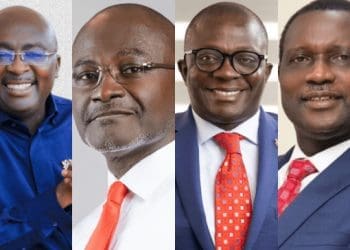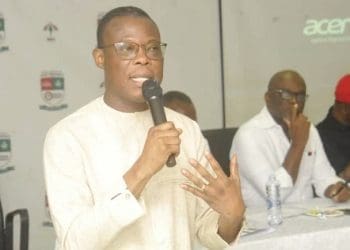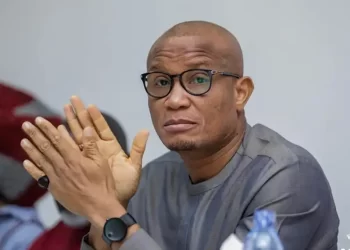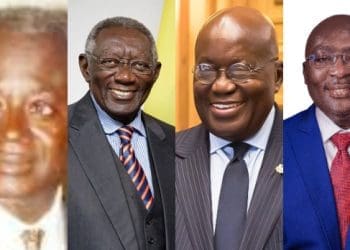Mr. David McAllister, Chair of the Committee on Foreign Affairs of the European Parliament, has urged Ghana and other African nations to carefully assess the long-term implications of their economic partnerships, particularly with global powers like China, while reaffirming the European Union’s (EU) commitment to fair and sustainable cooperation with Africa.
Mr. McAllister, speaking at a youth engagement session at the Ghana Institute of Management and Public Administration (GIMPA) in Accra on Wednesday, cautioned that while new trade agreements with China might appear generous, they could deepen trade imbalances and create dependencies that may not benefit Ghana’s long-term development goals.
He was responding to a student’s question about Ghana’s recent discussions with China to establish a zero-tariff trade arrangement for certain products.
The event formed part of the delegation’s broader mission to engage West African governments and civil society on strengthening EU-Africa relations under the themes of democracy, trade, and youth empowerment.
The EU Parliament Chair stressed that Ghana, as a sovereign state, had every right to choose its partners, but warned that such partnerships must always be guided by sustainability, transparency, and equality.
“Zero tariffs from China might sound very generous at first sight, but one needs to put this in context. There is a huge trade imbalance between Ghana and China, which must be taken into account,” Mr. McAllister said.
He said: “The European Union has more or less a balanced trade with Ghana. Through the Economic Partnership Agreement (EPA) we’ve had since 2016, Ghana enjoys duty-free and quota-free access to the EU market, the world’s largest single market.”
Mr McAllister emphasised that the EU’s trade and development support to Ghana comes with “no strings attached,” contrasting the EU’s model of cooperation with what he described as China’s “different motives, different interests, and different values.”
“Our support is designed to promote sustainable growth and inclusive development, not dependency. We are an honest and sincere partner,” he noted.
Mr. McAllister, who led a six-member delegation of Members of the European Parliament (MEPs) on visit to Ghana, explained that the EU’s engagement with Ghana had evolved beyond traditional aid to encompass political, trade, and strategic cooperation.
He cited the EU’s Global Gateway initiative as the new blueprint for Europe’s partnership with Africa, focusing on building smart, clean, and secure links in energy, transport, and digital sectors, as well as strengthening local capacities in health and education.
“The Global Gateway is our answer to the challenges humanity faces today. We want to help build resilient economies and infrastructure fit for the 21st century, whether that means improving transport systems or producing vaccines locally, as we are supporting here in Ghana,” he said, referring to an EU-supported vaccine factory project expected to start production by 2026.
On broader international relations, Mr. McAllister addressed questions about the role of the United States in global development, expressing concern over America’s recent withdrawal from several international commitments, particularly in aid and development funding.
He said while the European Union remained a close ally of the United States through NATO and other strategic partnerships, Europe regrets Washington’s retreat from multilateral engagement, especially in supporting humanitarian and development
initiatives in Africa.
Mr McAllister said: “The United States of America should be leading, not leaving international institutions,” he remarked. “We have seen the effects of the U.S. cutting support for USAID and other development programmes. These decisions have left noticeable gaps in regions facing famine and humanitarian crises. The European Union is trying to fill some of these gaps, but we do not have the financial capacity to cover them all.”
He said Europe’s foreign policy approach remains grounded in multilateralism, cooperation, and the defense of the international rules-based order. He reaffirmed the EU’s desire to work closely with Ghana and other African nations to promote peace, stability, and economic resilience in an increasingly competitive global landscape.
“Ghana has proven itself as a leader in democratic governance, peacekeeping, and regional diplomacy within ECOWAS. These are values we deeply admire and wish to strengthen through our partnership,” he said.
He noted that while competition among global powers for influence in Africa was inevitable, what mattered most was that African countries engaged in partnerships that respected sovereignty, promoted equality, and fostered sustainable development.
“Every country, including Ghana, must look carefully at what each partner offers, not only in terms of immediate gains but in the long-term implications for national development,” he advised.
The engagement at GIMPA, organised as part of the European Parliament’s outreach programme on youth participation and development cooperation, brought together students, youth leaders, and policymakers for open dialogue on Ghana’s future and the role of international partners in shaping it.
In attendance were Rune Skinnebach, Head of the EU Delegation to Ghana; Mr. Jonas Claes, Head of Political, Press and Information; Alhaji Inusah Mahama, Deputy Chief Executive Officer of the National Youth Authority; and Prof. Ebenezer Adaku, Deputy Rector of GIMPA.
Mr. McAllister reaffirmed the European Union’s steadfast commitment to working with Ghana and its youth to build a more equitable global economy.













